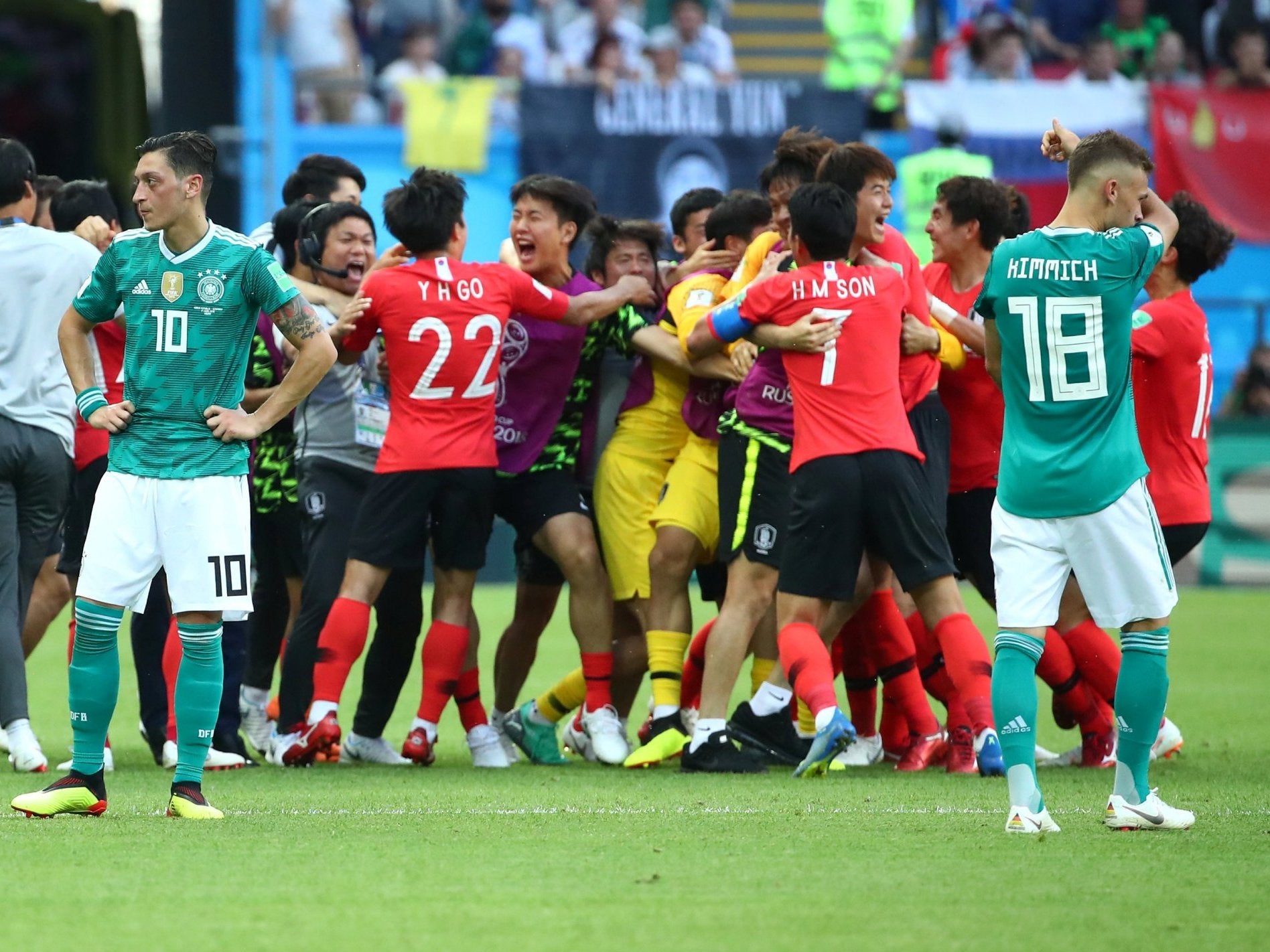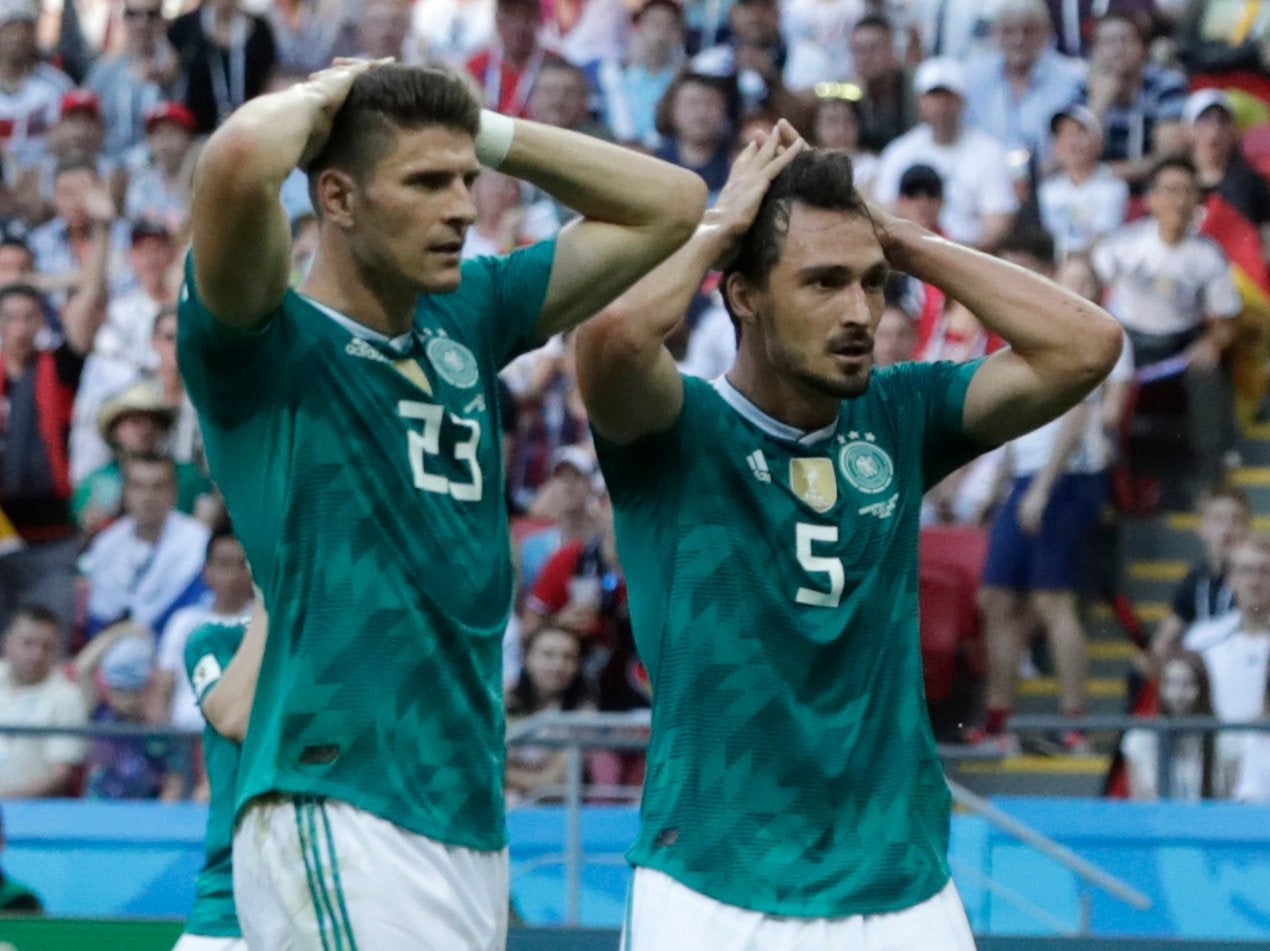Germany out of World Cup 2018 after losing to South Korea as Sweden and Mexico progress
South Korea 2-0 Germany: The defending champions crashed out of the tournament after goals from Kim Young-Gwon and Son Heung-min in Kazan

Your support helps us to tell the story
From reproductive rights to climate change to Big Tech, The Independent is on the ground when the story is developing. Whether it's investigating the financials of Elon Musk's pro-Trump PAC or producing our latest documentary, 'The A Word', which shines a light on the American women fighting for reproductive rights, we know how important it is to parse out the facts from the messaging.
At such a critical moment in US history, we need reporters on the ground. Your donation allows us to keep sending journalists to speak to both sides of the story.
The Independent is trusted by Americans across the entire political spectrum. And unlike many other quality news outlets, we choose not to lock Americans out of our reporting and analysis with paywalls. We believe quality journalism should be available to everyone, paid for by those who can afford it.
Your support makes all the difference.In the past 16 World Cups, Germany have never failed to make it to the last eight. They came to Russia as World and Confederations Cup champions, as a nation that had industrialised youth development, that seemed to have effectively eliminated the possibility of failure. But football has a strange way of making a mockery of the most well-grounded predictions and they went home after losing to a South Korea side that had already lost to Sweden and Mexico.
What was baffling here was how limp Germany were. There was no cavalry charge, no siege laid to the Korean goal. There was a passivity, a meek acceptance of fact. As news of Sweden’s goals broke, Jogi Low hurled on Mario Gomez and Thomas Muller, and it made not a scrap of difference.
The knife, in the end, was lunged in by VAR, which showed Toni Kroos prodding back the ball that Kim Young-gwon lashed home from a late corner, overturning an offside call. And then, as though the gods had decided thoroughly to mock Germany, Manuel Neuer, whose peregrinations form his goal have been such an asset for Germany, was caught in possession high up field by Ju Se-jng. He whacked a long ball into the Germany half and Son Heng-min chased on to rolled the ball into an empty net. It was Sweden and Mexico going through.
The South Korea coach Shin Tae-song has spent his tournament making excuses. Sweden, he said, were too tall. His side lost to Mexico because of some structural issue in the Korean league. Before Wednesday’s game, he seemed mildly irritated that Germany had not won their opening two games, meaning that they ended up going into this game needing a win and so unable to rest players. There simply hadn’t been time, he insisted, to prepare a strategy for such an eventuality.
He gave his team a one per cent chance of progress. Son Heung-min, trying to make the best of a bad situation, observed that while there was a one per cent chance there was hope – and there was. And, frankly, while Germany are as bad as this there was always hope.
Low made five changes to the side that had beaten Sweden, restoring Mesut Ozil and Sami Khedira and leaving out Thomas Muller for the first time since the semi-final of Euro 2012. That meant only three German outfielders had started all three group games, a staggering level of uncertainty for a team that had qualified so impressively and won the Confederations Cup. Given that tournament was won with what was essentially a second string, perhaps the issue was a surfeit of options.
Either way, this was a grimly disjointed display from Germany, the only real positive being that South Korea were never able to counter-attack them as Mexico and Sweden had. Not until six minutes before half-timewas there a German chance worthy of the name, Ozil laying in Timo Werner whose shot was deflected over by Kim Young-gwan.

Mats Hummels then turned sharply in the box from the resulting corner, only for Cho Hyeon-woo to smother at his feet. Cho made an even better save three minutes into the second half, leaping to his right to palm away Leon Goretzka’s header.
The Daegu FC keeper, whose flamboyant ginger Neymar-cut has earned him the nickname Dae Hair in Korea (a pun on De Gea, based in the fact “dae” means “great” in Korean), came into the tournament as third-choice, but he seized the opportunity after being selected for the opening game against Sweden because of his height and was arguably his country’s player of the tournament.

Löw had said he would make sure he was kept updated about the progress of the other game and, as Sweden scored, meaning Germany had to win, he threw on Mario Gomez and Müller. That perhaps did enhance the attacking treat offered by Germany, but it also recreated the issues in stifling counter-attacks that had dogged them against Mexico and, to a lesser extent, Sweden. A better side than South Korea would surely have taken advantage but, too often, there was a reluctance to shoot, an insistence on taking the extra touch that allowed Germany to recover.
But Germany, listless and disjointed as they had been at times in the early stages of the last World Cup but with no Miroslav Klose to save them, could not take advantage. Slowly, the castle subsided and a fourth of the last five world champions slipped out on the group stage. None, though, went with such a sense of surprise as this.
Join our commenting forum
Join thought-provoking conversations, follow other Independent readers and see their replies
Comments